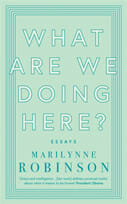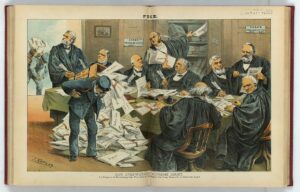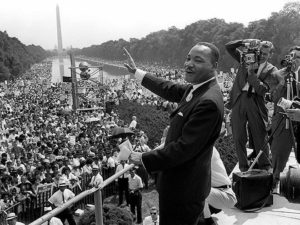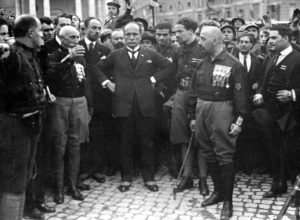Are We Losing Our Divinity?
Marilynne Robinson delivers some provocative but often frustrating writing on humanist education, history, and science versus theology. Little, Brown
Little, Brown

“What Are We Doing Here?”
A book by Marilynne Robinson
In “What Are We Doing Here?” Marilynne Robinson delivers some beautiful and provocative writing on various realms of the human mind and spirit. What primarily inspires and concerns her here is humanist education, history, science versus theology, religion and complexity.
A Calvinist Christian, Robinson maintains that we humans are part of an elevated and elevating sacred “we,” in a capital-D-Divine universe. This worldview echoes throughout the book, as does Robinson’s distress that, largely because of the influence of science, we are losing the Divine sense of humanity, no longer holding ourselves highest among species. Without such a collective self-image, she believes we fail to reach our capacities and raise one another to apexes of moral, intellectual and spiritual potential.
Robinson laments that what we think we know about American and European history is often based on myths, slivers of truth and reductive habit. She chides the public about the importance of learning what is true and worthy of our depths and heights—no small task in the era of wildly unequal education, lowbrow culture and accelerated fact fade. The sum of her observations seems to point to humans being on a one-way fast track to the lowest realms of existence, but she resists that conclusion.
Click here to read long excerpts from “What Are We Doing Here?” at Google Books.
All but one of these essays were composed as lectures for events at distinguished academic institutions. Each is thick with ponderables; just on this basis the book deserves the attention of our attention-deficit culture. Robinson traces essential differences between the Northern American settlers’ political and moral philosophy and those of the South, and connects the development and expansion of the university system to the Northern colonies, Massachusetts in particular. From the burgeoning university system came a remarkable broadening of minds, knowledge and ideals that our country’s best self offered to the future.
But unreliable narratives, repeated over the ages, sometimes with foreboding imagery, have burrowed into our culture, and flattened the many dimensions of our ingenuity and humanity, past and present. Along with inaccuracies that pass for common knowledge comes the problem that we cannot live up to the excellent ideals of our American origins unless we know the full range of our origins.
Stories of early American democracy and its inextricable link to the often and unfairly maligned Puritans are laced through the essays. The time when the Commonwealth idea was an aspiration, not an aspersion, sadly underlines our lost possibilities, especially with self-interest now so uncritically and aggressively embraced. And Robinson’s discussion of the establishment and growth of liberal education, “appropriate to a free people” is worthwhile and well-timed, connecting to the apparent American belief that we must “cede that freedom to the very uncertain promise of employability.” Her theological explorations engage and inspire, too, hitched as they are to faith in infinite human complexity and virtue, despite our species’ opposite capacities, so obvious in every era, realm and religion.
Robinson swipes at hypocrisies and paradoxes of modern culture, such as those exhibited by the extreme Christian right wing, Fox News and their friend, the president. And she acknowledges the enormous human tendency to err, but without examining how often that tendency pairs with power. The absence of a discussion of power in relation to corruption of morally influential institutional arenas is significant. The power of religions to shape developing minds at their most dependent and vulnerable, to repress and oppress women and people of color, and the link between patriarchal religion and authoritarian societies—these issues are deserving of in-depth attention and reform if religious faiths and ideals are to retain, and/or regain, stature.
Instead, Robinson denigrates cynicism as a stylish trend. She attributes its pervasiveness to the downgrading of Belief in favor of science, and affixes it to those who lack the vision of Divine humanity. Yet, the cynicism she reproaches is brought about by powerful people who swear fealty to the highest-minded principles, while undermining them with each step toward greater power and its abuse. That dishonesty appears to me far more insidious and widespread than cynicism. Power is ignored to the degree that Robinson implies citizens can shift not only the content of public discussions, but the skewed historical underpinnings on which they partially rest. In a country of our size, with so many overworked, ill-paid people, that is not likely, especially one with so wealthy and dominant an oligarchy. (In the last essay, “Slander,” she acknowledges the enormity of the problem, given the constant loud barrage of media.)
Robinson admits from the start to being “too old to mince words” any longer. Mincing is not so much the issue here, as is a habit of generalizing. Illuminating ideas and language share too much space with sweeping statements, despite her rebukes to reductionism on matters of history and experience.
The statement in her preface that all liberals “subscribe to the notion that everything that happened in our history is to be understood in its essence as profit driven” was startling. To understand that the economic strength of the country was established with slave labor and genocide does not quash awareness of other ideals, efforts and intentions that many struggled to institutionalize. Claims of this sort undermine other cogent observations about ignorance and ideology. I supposed that generalizations in the preface would be fleshed out with evidence in the chapters. Though filled with references—Robinson is fond of using quantum physics in her arguments about complexity and unknown possibility—more than a few of her declarations lack reasonable, believable backup.
The most confounding excesses have to do with her conflicting attitudes about science. She marvels at the Divine abilities allowing humans to create a scientific method for investigating the universe, but also disparages science for assuming it is the “arbiter of reality,” a grandiose and unfair assertion. Rather, as with all branches of knowledge, there are factual building blocks of science. (Her claim that science is responsible for edging religion and theology from their rightful perch and diminishing the vast complexity and moral essence of humanness bears no relation to what I was taught or heard at home, where I was half raised by a scientist of faith. Over 12 years of a Catholic and generally solid education, however, I was introduced to many falsehoods, myths and absurdities in church and religion classes.)
She is particularly and regularly tough on Darwinism. Has she not read of the astounding “neural” networks through which trees and fungi communicate and cooperate? Though these networks were undiscovered in Darwin’s time, references in his writings to sympathy and cooperation outnumber those to competition. The idea of survival of the fittest is a cultural crutch leaned on both by Robinson and the free market faithful.
As she admits, so much of the controversy concerning science and theology comes down to: “Some people believe in God and some people don’t.” That made me laugh, but there’s little humor in these pages. (Still, that brought up a funny Mark Twain contemplation on the subject of God: “Take the fly, for instance. The planning of the fly was an application of pure intelligence, morals not being concerned. Not one of us could have planned the fly; not one of us could have constructed him; and no one would have considered it wise to try, except under an assumed name.”)
There is no arguing with Robinson on the contributions of faith, theology, Scripture and religion to culture and the arts through time. And her thoughts on experience in relation to the mind and our culture’s oppositional antagonisms are involving, and often beautifully expressed. But the notion that the power and place of the Divine in humans is bolstered because there is so much more of which we are uncertain— knowledge to be found and possibility to behold—is unconvincing. It’s also a logical fallacy.
Equally unaccountable are insights about American trust in capitalist markets and the propensity for senseless war, both at huge human cost, offered pages away from a defense of President Obama, whose blinders were considerable in these areas. Robinson spent time in conversation with Obama, and deeply admired his suitability to the job of president. She asserts, “He has had little help from his friends, who think it is becoming in them to express disillusionment, to condemn drone warfare or the encroachments of national security, never proposing better options than those painful choices, which by comparison of others on offer, clearly spare lives.” That is a long declaration with nothing to back it up, even assuming Obama ascended with high moral aspirations, and understanding that foresight is in short supply everywhere. She expresses concern for his faith in American exceptionalism, but ascribes no force to actions and inactions of his that contributed, like those of the dull and undignified West Winger before him, to our current amoral moment in undemocratic government. “Prejudices and their power,” indeed, which Robinson wrote regarding one of her references to cliches of Puritanism that have survived American un-history.
I was drawn to “What Are We Doing Here?” by its timelessly apt title, and because Robinson’s use of language in fiction can be like raindrops that look like diamonds in just the right light in just the right cup of budding leaves. But more than a few times I thought to myself, “What am I doing here?”—only partially because I’m not a religious person, and come from a far-inferior educational pedigree. As elegant as some of her thinking and language is, the collection is repetitive, and would have been a more enjoyable, incisive read with some joining of edited lectures. The whole is also reliant on broad generalizations, with arguments that antagonize and diminish one another. I admire Robinson for taking on deep, affecting subjects head-on, but wonder if her searching mind and prodigious skills may be most divinely realized in the fictional world.
Your support matters…Independent journalism is under threat and overshadowed by heavily funded mainstream media.
You can help level the playing field. Become a member.
Your tax-deductible contribution keeps us digging beneath the headlines to give you thought-provoking, investigative reporting and analysis that unearths what's really happening- without compromise.
Give today to support our courageous, independent journalists.






You need to be a supporter to comment.
There are currently no responses to this article.
Be the first to respond.